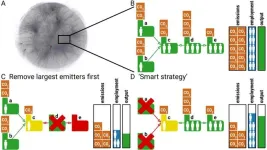(Press-News.org) ROCHESTER, Minnesota — Mayo Clinic researchers recently invented a new class of artificial intelligence (AI) algorithms called hypothesis-driven AI that are a significant departure from traditional AI models which learn solely from data.
In a review published in Cancers, the researchers note that this emerging class of AI offers an innovative way to use massive datasets to help discover the complex causes of diseases such as cancer and improve treatment strategies.
"This fosters a new era in designing targeted and informed AI algorithms to solve scientific questions, better understand diseases, and guide individualized medicine," says senior author and co-inventor Hu Li, Ph.D., a Mayo Clinic Systems biology and AI researcher in the Department of Molecular Pharmacology and Experimental Therapeutics. "It has the potential to uncover insights missed by conventional AI."
Conventional AI is primarily used in classification and recognition tasks, such as face recognition and imaging classification in clinical diagnosis, and it has been increasingly applied to generative tasks, such as creating human-like text. Researchers note that conventional learning algorithms often do not incorporate existing scientific knowledge or hypotheses. Instead, these rely heavily on large, unbiased datasets, which can be challenging to obtain.
According to Dr. Li, this limitation considerably restricts the flexibility of AI methods and their uses in areas that demand knowledge discovery, like medicine.
AI is a valuable tool for identifying patterns in large and complex datasets like those employed in cancer research. The central challenge in using conventional AI has been maximizing the embedded information within those datasets.
"Lack of integration between existing knowledge and hypothesis can be a problem. AI models may produce results without careful design from researchers and clinicians what we refer to as the 'rubbish in rubbish out’ problem," says Dr. Li. "Without being guided by scientific questions, AI may provide less efficient analyses and struggle to yield significant insights that can help form testable hypotheses and move medicine forward."
With hypothesis-driven AI, researchers look to find ways to incorporate an understanding of a disease, for example, integrating known pathogenic genetic variants and interactions between certain genes in cancer into the design of the learning algorithm. This will enable researchers and clinicians to determine which components contribute to model performance and, hence, enhance interpretability. Further, this strategy can address dataset issues and promote our focus on open scientific questions.
"This new class of AI opens a new avenue for better understanding the interactions between cancer and the immune system and holds great promise not only to test medical hypotheses but also predict and explain how patients will respond to immunotherapies," says Daniel Billadeau, Ph.D., a professor in Mayo Clinic's Department of Immunology. Billadeau is a co-author and co-inventor of the study and has a long-standing research interest in cancer immunology.
The research team says hypothesis-driven AI can be used in all sorts of cancer research applications, including tumor classification, patient stratification, cancer gene discovery, drug response prediction and tumor spatial organization.
Benefits of hypothesis-driven AI:
Targeted: Focuses on specific hypotheses or research questions.
Leverages existing knowledge: Guides exploration to find previously missed connections.
More interpretable: Results are easier to understand than with conventional AI.
Reduced resource needs: Requires less data and computing power.
"Machine-based reasoning": Helps scientists test and validate hypotheses by incorporating hypotheses and biological and medical knowledge into the design of the learning algorithm.
Dr. Li notes that the disadvantage of this tool is that creating these types of algorithms requires expertise and specialized knowledge, potentially limiting wide accessibility. There is also potential for building in bias, and they say researchers must watch for that when applying different pieces of information. In addition, researchers generally have a limited scope and won't be formulating all possible scenarios, potentially missing some unforeseen and critical relationships.
"Nonetheless, hypothesis-driven AI facilitates active interactions between human experts and AI, that relieve the worries that AI will eventually eliminate some professional jobs," says Dr. Li.
Since hypothesis-driven AI is still in its infancy, questions remain, such as how to best integrate knowledge and biological information to minimize bias and improve interpretation. Dr. Li says despite the challenges, hypothesis-driven AI is a step forward.
"It can significantly advance medical research by leading to deeper understanding and improved treatment strategies, potentially charting a new roadmap to improve treatment regimens for patients," says Dr. Li.
Review the study for a complete list of authors, disclosures and funding.
END
Mayo researchers invented a new class of AI to improve cancer research and treatments
2024-04-15
ELSE PRESS RELEASES FROM THIS DATE:
Machine learning could help reveal undiscovered particles within data from the Large Hadron Collider
2024-04-15
Scientists used a neural network, a type of brain-inspired machine learning algorithm, to sift through large volumes of particle collision data.
Particle physicists are tasked with mining this massive and growing store of collision data for evidence of undiscovered particles. In particular, they’re searching for particles not included in the Standard Model of particle physics, our current understanding of the universe’s makeup that scientists suspect is incomplete.
As part of the ATLAS collaboration, scientists ...
metaphacts and Dimensions launch the Dimensions Knowledge Graph, powered by metaphactory
2024-04-15
Digital Science solutions metaphacts and Dimensions are excited to announce the highly anticipated launch of the Dimensions Knowledge Graph, a large ready-made knowledge graph powering AI solutions in the pharmaceutical and life sciences industries.
The Dimensions Knowledge Graph, powered by metaphactory, is an all-in-one knowledge graph solution, ready-made for easy integration with customers’ data infrastructure and existing internal knowledge graphs. At its core is an explicitly defined and flexible semantic model that can be easily extended to include internal data (which can range from domain expert knowledge or data from internal documents) ...
Parent perceptions of school meals influence student participation in school meal programs
2024-04-15
Philadelphia, April 15, 2024 – Since the implementation of the Healthy, Hunger-Free Kids Act in 2010, school meals in the United States have significantly improved. Several factors have been reported to impact student participation in school meals, including parental perceptions of school breakfast and lunch. A recent research article in the Journal of Nutrition Education and Behavior, published by Elsevier, assessed the association between parent perspectives on the school meal program and student participation.
Researcher ...
Hydrogen recombination found to be most plausible explanation for high levels of energy in stellar superflares
2024-04-15
Although their primary purpose is to look for exoplanets, observatories like the Kepler Space Telescope and the Transiting Exoplanet Survey Satellite (TESS) have supplied a vast amount of data on stellar flares, detected with high-precision photometry by broadband filters in the visible light spectrum.
The stars are so far away that they appear only as points of light to these telescopes, and the phenomena interpreted as stellar flares are abrupt increases in the brightness of these points.
There is also a lack of data in other parts of the electromagnetic spectrum, and most studies of these events focus on irradiated ...
Microplastics make their way from the gut to other organs, UNM researchers find
2024-04-15
It’s happening every day. From our water, our food and even the air we breathe, tiny plastic particles are finding their way into many parts of our body.
But what happens once those particles are inside? What do they do to our digestive system?
In a recent paper published in the journal Environmental Health Perspectives, University of New Mexico researchers found that those tiny particles – microplastics – are having a significant impact on our digestive pathways, making their way from the gut and into the tissues of the kidney, liver and brain.
Eliseo Castillo, PhD, an associate professor in the Division of Gastroenterology ...
Unlocking the secrets of forest heights: the role of GEDI LiDAR technology
2024-04-15
A team of researchers has unveiled a novel approach to accurately characterizing tree height composition in forests using the Global Ecosystem Dynamics Investigation (GEDI) Light Detection and Ranging (LiDAR) technology. This study marks a significant advancement in our understanding of forest ecosystems, shedding light on the intricacies of tree height variability and its implications for ecological studies and climate change mitigation efforts.
Tree height composition, a vital ecological attribute, plays a significant role in influencing forest ecosystems, impacting biodiversity, carbon ...
Canada likely to miss WHO's Hepatitis C elimination target, research shows
2024-04-15
Canada will not reach the original World Health Organization's (WHO) target of eliminating the Hepatitis C virus (HCV) by 2030 and lags in comparison to other developed countries, a new study led by researchers at the University of Waterloo has found.
HCV is an infection that poses a major public health threat that affects an estimated 250,000 Canadians – despite having a highly effective medication.
When gone unscreened, HCV is a highly debilitating infection that causes liver failure and could lead to death. Due ...
Pyrite, also known as fool’s gold, may contain valuable lithium, a key element for green energy
2024-04-15
There’s a reason airlines won’t let you put your laptop in your checked luggage; the lithium-ion battery poses a serious fire hazard. But why? Lithium is incredibly reactive. For instance, pure lithium violently interacts with seemingly innocuous water, releasing heat and forming highly flammable hydrogen. This reactivity, however, is exactly why lithium makes a great material for batteries, and why it is a critical mineral for the green energy transition. Lithium-ion batteries are widely used in electric vehicles. Plus, they can store energy produced by renewable resources like solar and wind.
In recent years, lithium demand has skyrocketed. Primary ...
Is there a quick fix for ocean acidification? (video)
2024-04-15
WASHINGTON, April 15, 2024 — Acidification is threatening the ocean’s ability to pull carbon dioxide out of our atmosphere, so scientists and startups are looking to ocean-sized antacids to raise its pH. While they might not be the ultimate solution to our climate crisis problem, the antacids could have a hand in helping our oceans rebound. https://youtu.be/PqFwRMgvMVY?si=1VSbf7zaWbZQ3d25
Reactions is a video series produced by the American Chemical Society and PBS Digital Studios. Subscribe to Reactions at http://bit.ly/ACSReactions and follow us on X, formerly Twitter @ACSReactions.
The American Chemical ...
Reducing CO2 emissions by 20% with only a 2% economic loss
2024-04-15
[Vienna, April 15 2024] — A “rapid and far-reaching change” is necessary to prevent catastrophic climate change, according to the Intergovernmental Panel on Climate Change (IPCC). "However, the transformation of the economy towards climate neutrality always involves a certain amount of economic stress -- some industries and jobs disappear while others are created," explains Johannes Stangl from the Complexity Science Hub (CSH). When it comes to climate policy measures, how can economic damage be minimized?
A ...


